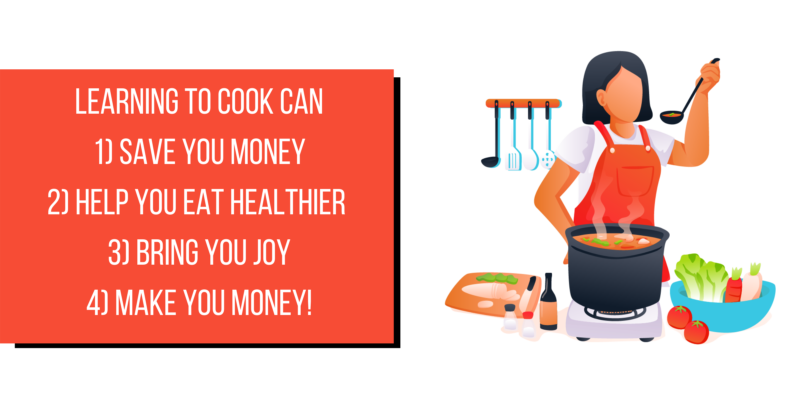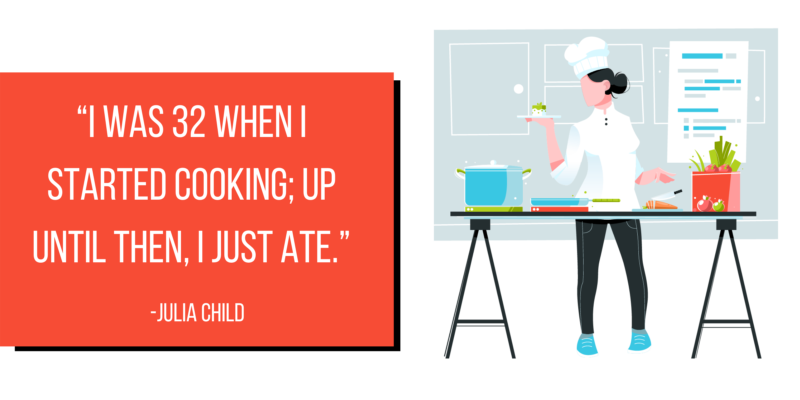Learning to cook is rewarding, incredibly functional, can help you save money, and lead to a new career.
Cooking is a way to express yourself, as well as grant yourself and other people endless flavor experiences. There are many culinary areas you can master. Maybe you want to be a baker, or perhaps you want to eat healthier. If you’re looking to expand your social network, you can invite people over to enjoy delicious meals you made.
Becoming a proficient cook is also a great way to earn money. While some restaurants and other businesses that sell prepared food require education and experience, if you can consistently produce delicious food, you’ll likely find opportunities to work in this diverse field.

Also, if you master a specific dish or cuisine, you won’t be the first to begin your own successful business. If you’ve ever hoped to work for yourself, starting a business around the food you make is difficult, but certainly doable.
There are several roads you can take to becoming a better cook. You can teach yourself, take free courses, pay for a class in cooking, or get a degree in the field.
Let’s look at your options, along with some of the benefits and drawbacks of each:
Self-Teaching Yourself to Cook
When you’re trying to learn how to cook on your own, you should define your goals. Are you trying to save money? Learn an enriching new skill? Eat healthier? Bring family and friends together? Build new marketable skills, begin your own business, or work for another one?
Depending on what you want to do with cooking you can better decide what to study, how much instruction you need, and where to start building skills.
Also, ask yourself honestly, how skilled are you to begin with? Are you starting with a little bit of cooking experience a moderate amount, or are you looking to build on extensive cooking skills and take them to the next level? Sometimes a more formal education will benefit beginners, and other times it’s just the thing that can lift you beyond amateur status.
Regardless of where you estimate yourself, we’re in the self-teaching section of this guide. No matter what you decide, improving your cooking at home is a great way to begin, and can be supplemented by more formal training.
- Are you starting with little to no cooking skills at all?
- Look up Youtube videos that go over basic cooking prep, knife work, seasoning, and practice some simple recipes you find on Google.
- You can learn basic methods like roasting, stir-frying, sautéing, and more that can be done without much time or attention. There are plenty of instructions on picking ingredients, seasoning combos, making healthy choices and more.
- Are you looking to make meals for yourself at home?
- People often excuse eating out, getting delivery or take out, or doing anything to avoid cooking for themselves by saying it takes too much time. However, there are infinite meals that take 20 minutes or less to prepare at home. By committing to make at least one meal a day at your home, working with a small range of tools and vessels, and following the recipes of at least one resource, you can take your home-cooking habit from wishful thinking into reality.
- Do you want to prepare larger meals for yourself, family, and friends?
- Once you’re cooking for others, you’ll need to up your ingredient purchasing, the number of components in the meals you make, and of course, you’ll want it to be delicious. Cooking for others is a gift, and seeing delighted faces enjoying something you made will fill you with joy.
- Are you starting with some cooking skills but want to expand on them?
- If you have some of the basics down, it might be time to improve, something you can also use tutorial videos, cooking books, and search engines to help with. You can practice and learn basic knife skills, use better ingredients, take more time on meals, make reductions, or try a new area of cooking you haven’t explored yet, like baking.
- Are you trying to learn to cook to have a healthier lifestyle?
- One of the best reasons to cook is to live healthier. Many resources will help you cook delicious, nutritious meals that can suit any dietary restrictions you want or need to enforce on yourself. Cooking with a purpose is a great way to decide what you’ll teach yourself.
- Do you want to cook more often to save money but still eat delicious meals?
- Here’s another great constraint in your culinary self-instruction. Researching delicious meals that cost $15 or less to make will yield endless options for you to work on and get better at. Define your success in the money you save, and how much you enjoy the meals you make.
- Do you want to learn culinary skills to work for yourself or others?
- It’s challenging, but there are many chefs and working cooks that are self-taught. You’ll need to work very hard, for long hours, and to learn from whoever you can who has more knowledge than you. You might get a job in a kitchen by any means, even if you’re doing the lowest level work (think chopping vegetables for months or years). More than anything, you’ll need passion. People have started baking or catering businesses from their kitchens. But they, and the people that ate their food, had to love what they created. If you can’t get enough of cooking, keep going. You’ll be rewarded the more you put into it.
Pros
- Learn on your own, at your own pace
- Decide exactly what you’ll learn and practice
- Completely free
Cons
- You might benefit more from structured instruction
- Easy to get distracted and discouraged
- Not all resources and techniques you find will be useful or easily understandable without assistance
Not-For-Credit Culinary Courses
If you want to dip your toe into a culinary education, you might consider taking a free online culinary course. You won’t earn college credits in these courses, but it’s a great way to expand your knowledge and experience while figuring out if a cooking education is right for you. Some top options you might consider include:
- The BBC’s Cooking Techniques course, which covers different areas like meat, fish, desserts, fruits and vegetables, pasta preparation, sauces, pastries, and much more. Different categories you can pursue have lessons like filleting fish, roasting ducks, skinning tomatoes, and other common tasks that will expand your hard culinary skills.
- The New York Times offers Cooking with The Times, encompassing 39 distinct lessons. You’ll learn about deep-frying, omelet preparation, lasagna, calamari, and much more. Each lesson comes with tips and recipes, and many have video guides as well.
- Texas A&M presents Dinner Tonight, which has short videos, basic cooking techniques, step-by-step instructions, great recipes, and more.
- Allrecipes.com has How-to Videos that include more than 90 tutorials, made up of videos and descriptive articles. Devil eggs, stir-fry veggies, roast garlic, freeze cookies, and much more.
- The prestigious Massachusetts Institute of Technology lets you access its Kitchen Chemistry, covering everything from molecular gastronomy to spaghetti. This course has homework assignments, applicable readings, practical chemistry through cooking, and much more. To fully participate you’ll need to purchase a book that goes along with this course.
There are also many MOOCs that you can take on cooking and culinary arts. MOOCs are Massive Open Online Courses that are generally free, and a great way to learn about cooking or anything else you’re interested in. You don’t need to commit that much time, and very little to no money to these programs, but you still get a structured course taught by experts in the field.
Pros
- Mostly free
- A step between DIY and committing lots of time and money to learning how to cook
- Learn time-tested techniques, skills, and build significant culinary knowledge from home
Cons
- Requires self-directed consistent commitment to progress
- No direct person-to-person instruction
- Not as comprehensive as more traditional courses
More Structured Culinary Courses and Culinary or Cooking Degrees
If you’re sure you want to expand your culinary expertise past the limitations of DIY and free courses, you can opt to pay for a cooking class or a degree in the field.
There are paid and free classes that are offered online, but a great resource for finding paid in-person courses near you can be found here.
Some of your options for culinary degrees and certifications include:
- Associate’s Degrees in Culinary Arts
- Associate’s Degrees in Baking and Pastry Arts
- Bachelor’s Degrees in Culinary Arts
- Culinary Arts Certificate
There are also online options like:
- Online Associate’s Degrees in Culinary Arts
- Online Bachelor’s Degrees in Food Management
- Online Pastry Arts Degrees
- Online Culinary Arts Management Certificate
- Online Cake Decorating Training
You can also opt for degrees in hospitality, nutrition, food management, and other degrees adjacent to the culinary arts.

Graduates can work as chefs in restaurants, bakers, food writers, nutritionists, line cooks, marketing, food management, in hospitality, as private chefs, start their own food business, and much more.
At Degree Query we’ve worked hard to give you a host of resources on all educational topics. We’ve covered the world of cooking, nutrition, culinary arts, food management, and hospitality extensively.
Check out our related resources here:

